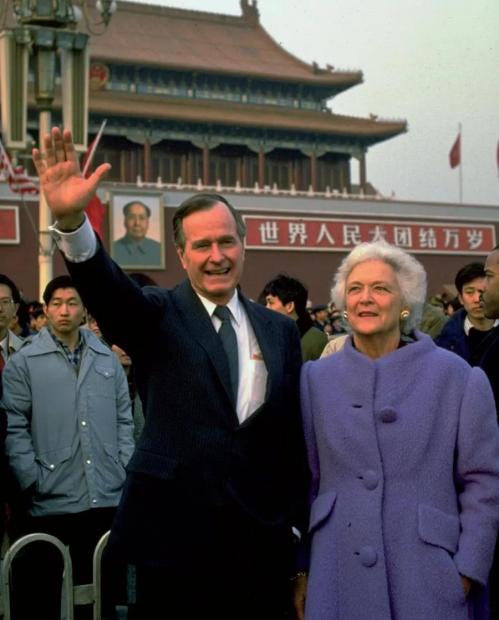
In a recent speech at a literary event, former librarian of the British Library Frances Wood recollected how former Chinese premier Wen Jiabao, during a visit to Britain in 2011, said he read Shakespeare in his younger years and wanted to pay homage to the Bard's birthplace in Stratford-upon-Avon. Wood wondered why no British Prime Minister had requested to see the homes of the authors despite early exposure to Chinese classics such as Journey to the West or Dream of the Red Mansion.
That reminded me of President George H.W. Bush and Pearl S. Buck.
The senior Bush was among the favorite US presidents for the Chinese. As the second director at the US Liason Office in China after the normalization of US-China relations, Bush wandered around Beijing on a bike with his wife and had fried dough sticks and bean curd soup for breakfast like a Beijing resident. Later, as US president, he adopted a pragmatic and constructive approach to Sino-US relationship, actively engaging China in the world economy and politics. Without exaggeration, Bush Sr. contributed most to decades of goodwill between the two countries and the two peoples as a US president.
Although often criticized for a lack of vision, he did have a grand one. In the foreword to his China diaries, he wrote: "I love the Chinese people. One of my dreams for our world is that these two powerful giants will continue working toward a full partnership and friendship that will bring peace and prosperity to people everywhere."
His dream has come true: Today, the relationship between China and the United States is the most important of all bilateral relationships in international politics.
Having gone through the Cold War and decades of separation, more people may tend to see other people living in a different system with indifference or hostility as they continue to use the lens of gross generalizations. Where did Bush's goodwill come from?
We got a glimpse into the formation of his goodwill on Oct 17, 1998, when Bush Sr. visited my alma mater Nanjing University in Jiangsu province to receive an honorary doctoral degree. Nanjing University was also home of the Johns Hopkins University-Nanjing University Center for Chinese and American Studies. Founded in 1986 during the Reagan-Bush administration, the center actively promotes cultural understanding between the two countries.
It was during his visit to Nanjing that Bush Sr. requested to see Pearl S. Buck's house, the house where Buck, then a missionary and a professor of English at the university, wrote The Good Earth, which demystified the Chinese farmers that constituted the majority of the Chinese people during Buck's time.
According to Haiping Liu, a Pearl Buck scholar and former dean of the School of Foreign Studies at Nanjing University, the request came as a surprise for the event organizers who did not see the visit on the agenda. Few would have known that Bush Sr. was aware of the existence of Buck's house in Nanjing University when even some university administrators and professors didn't know anything about it. Liu, then a professor at the university, had written to Bush about Pearl Buck's connection with Nanjing University, but even he was not expecting the former US president to really visit the little-known house.
Bush Sr. told the event organizers that he had read Pearl Buck's works in his younger years, and declared himself to be a fan of Buck, a Nobel laureate and Pulitzer Prize winner, who dedicated much of her life to promoting to the world, through her prolific writing and social activism, what the Chinese people were like. Her work must have given Bush Sr. an appreciation of China and the Chinese people with a nuance that today's crude representations on social media could never approximate.
It is sad to see the recent setbacks in US-China relations because trade and other conflicts, which make us all the more nostalgic about the paths that people like Pearl Buck and Bush Sr. had blazed for mutual understanding and appreciation. It requires an open mind and an empathic heart to get to know a different people, and it takes effort to write and read about them to gain useful insights. When one truly knows another, he or she is less likely to misinterpret or misjudge another person.
Today, American expatriates still read Pearl Buck's works as an orientation to China, as literature sometimes presents as much truth about a society as history could, if not more.
Chinese publishers are translating both major and minor works by American authors, causing an imbalance in understanding due to the lack of American interest in importing works from China. There is a deficit of translation, which has widened the gaps of knowledge. When was the last time you saw a Chinese book translated into English at a US airport bookstore?
I am more than happy to know that President Xi Jinping and his US counterpart President Donald Trump have reached an agreement to bring Sino-US relations back on track by suspending the tariffs war. This decision coincided with the death of Bush Sr. at the age of 94. As people across the Pacific remember him and his engagement policies with China, I would suggest that one way to remember Bush Sr. is to invest time and effort in understanding the "other", people not like us. If we do not, someone else will smuggle myths and hearsay into our discourse which we will eventually regret.
The author is a US-based English-Chinese literary translator who has translated two biographies of Pearl S. Buck.
Originally published with China Daily on December 6, 2017
0
推荐



 京公网安备 11010502034662号
京公网安备 11010502034662号 